本文由 建筑营设计工作室 授权mooool发表,欢迎转发,禁止以mooool编辑版本转载。
Thanks ARCHSTUDIO for authorizing the publication of the project on mooool. Text description provided by ARCHSTUDIO.
建筑营设计工作室:项目位于北京东城区钱粮胡同一片院落之间,占地面积约410平方米。原有建筑并不是四合院常见的坡顶建筑,而是几个相互分离的砖混平顶房。平顶房应该是四合院某一时期被改建的结果,在旧城之中也有不少这样的房子。
ARCHSTUDIO: The project is located in Qianliang Hutong, Dongcheng District, Beijing, with a site area of about 410 square meters. Different from a typical “Siheyuan” with sloped roof, the original architecture was composed of several disconnected flat-topped rooms featuring a traditional brick-and-concrete structure, which are supposed to be transformed from a Siheyuan at one time and can be seen in many old areas of Beijing.
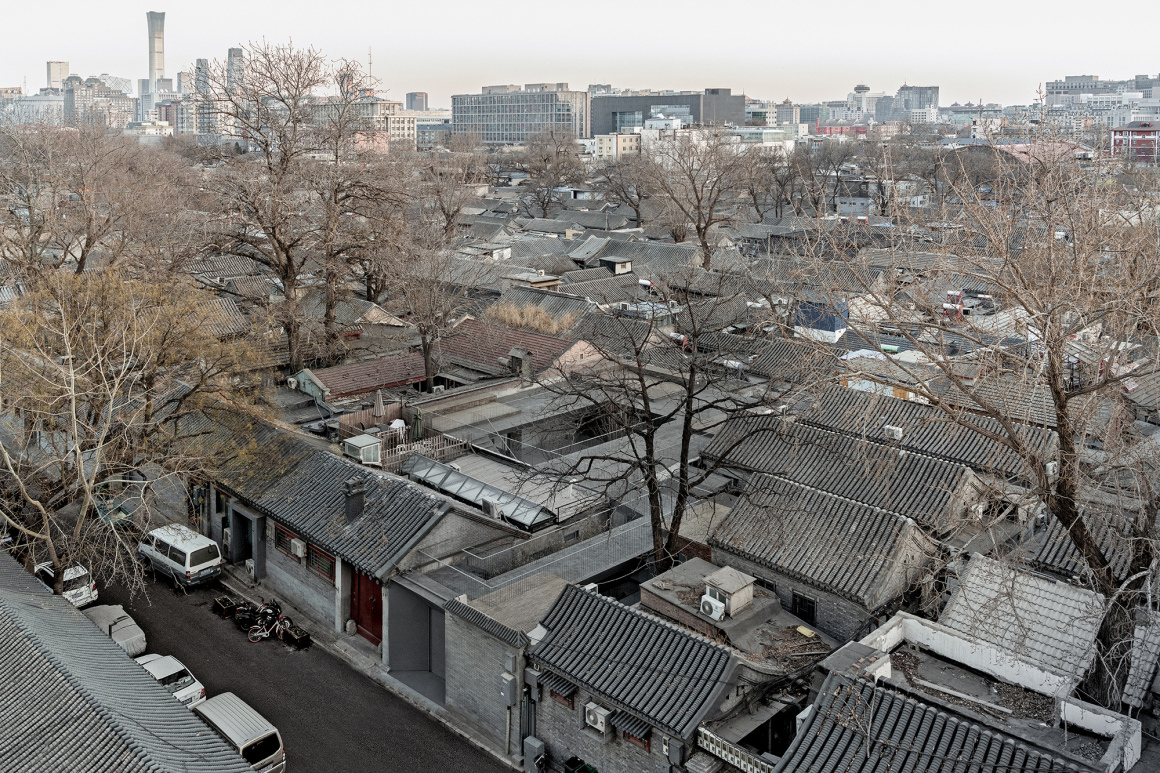
场地分前后两个部分,前部是一块空地,包含两个砖房和一棵老树;后部是一个U形建筑体,玻璃屋顶盖住了内院。旧建筑结构老化,房间狭小封闭,缺少基础设施,已经无法满足当代生活的使用,需要彻底改造。改造之后的建筑将出租给潜在的客户,需要满足可办公、可聚会、可居住的弹性使用。因此,本次改造的主要挑战是:如何基于现存条件做恰当的拆改,增加建筑空间的活力,回应不确定的功能。
The site consisted of two parts. The front part was an open ground with two brick rooms and an old tree, while the rear part presented a U-shaped structure and had a courtyard roofed by glass. The original building, with isolated and narrow rooms and a lack of infrastructures, was gradually worn out so that it needed to be completely reconstructed in order to meet the demands of modern life. The rebuilt building will be rented for multiple purposes such as working, friends gathering, and dwelling, so the greatest challenge for this transformation project was how to present a more dynamic space with a variety of functions through appropriate demolition and renovation based on site conditions.
▼改造前 The existed project site
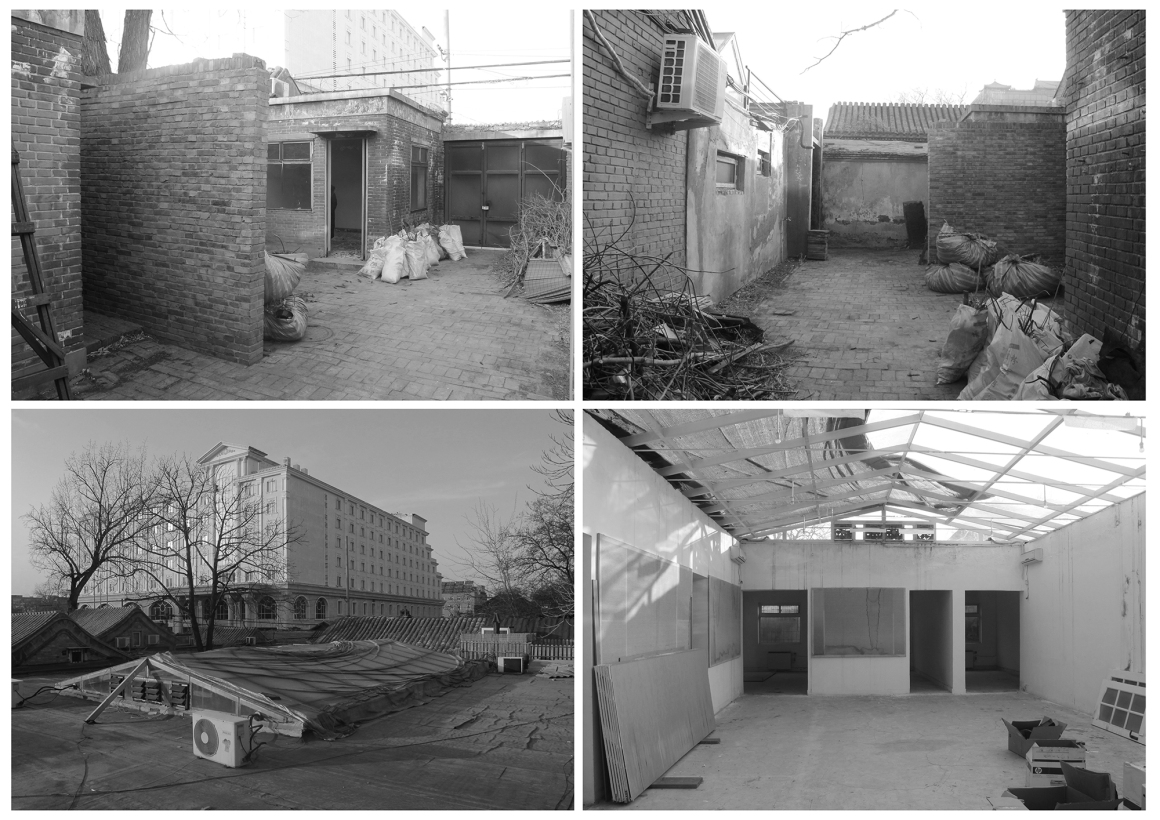

基于平屋顶建筑的特点,设计在旧有建筑平面格局上添加了连廊和楼梯,将屋顶与地面、房屋与庭院相互串联,成为一条可通达赏玩的折叠循环路线,让建筑的内与外、上与下、新与旧产生互动关系。
Considering the characteristics of flat-roofed buildings, ARCHSTUDIO added corridors and staircases to link rooms and yards, roof and ground respectively. In this way, a “folding” and looping circulation route was formed, allowing interactions between interiors and exteriors, up and down, and new and old.
▼生成图解 Generation illustration
▼轴测图 Axonometric diagram
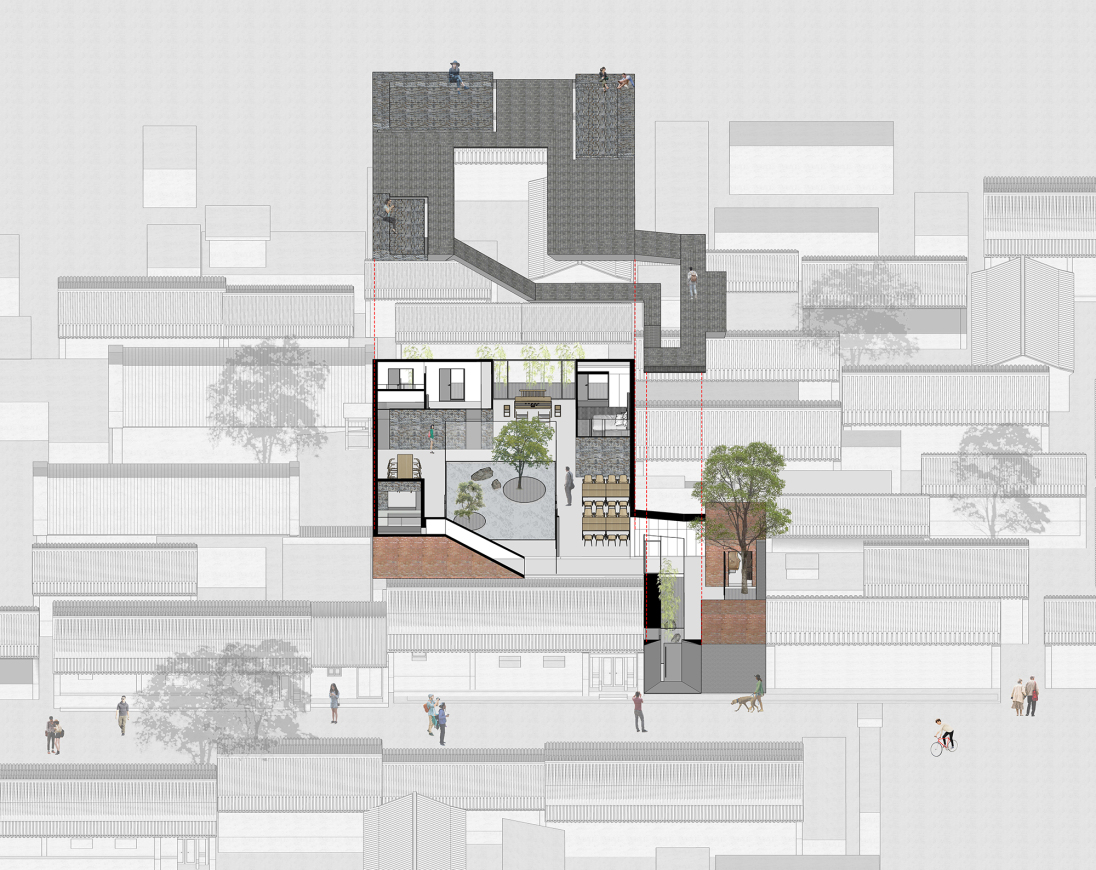
▼基于建筑的特点,设计在旧有建筑平面格局上添加了连廊和楼梯 Considering the characteristics of flat-roofed buildings, ARCHSTUDIO added corridors and staircases
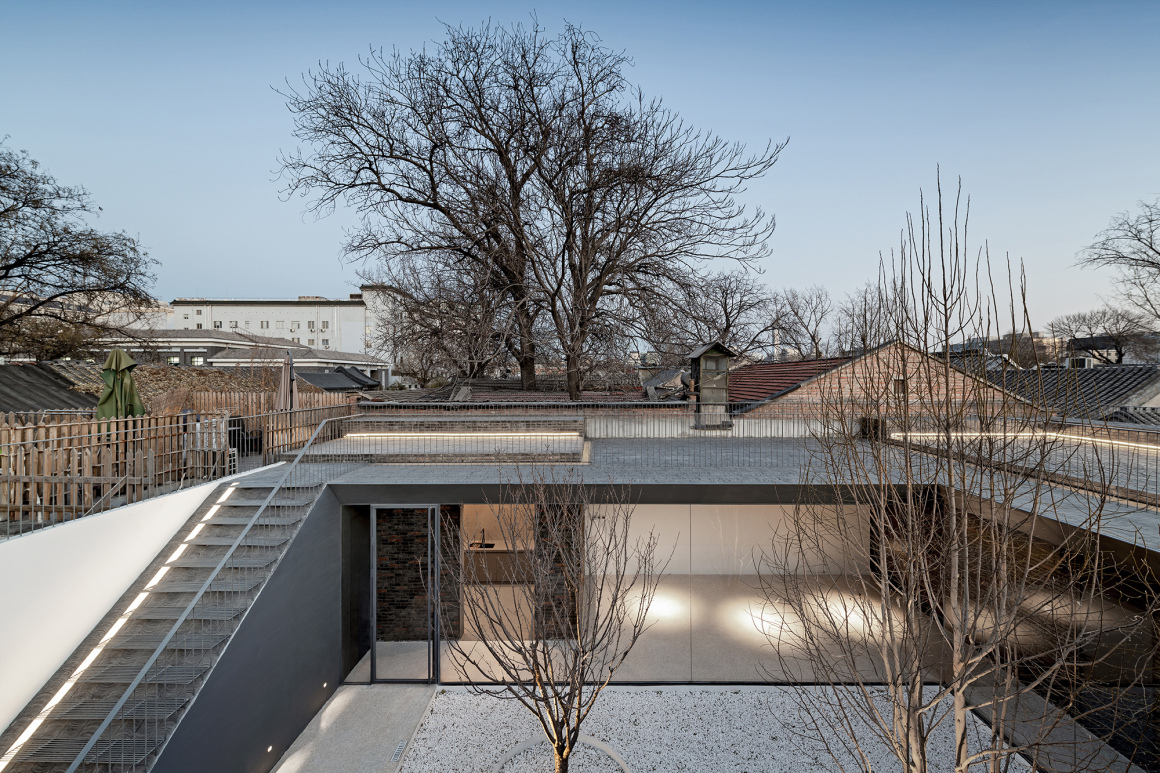
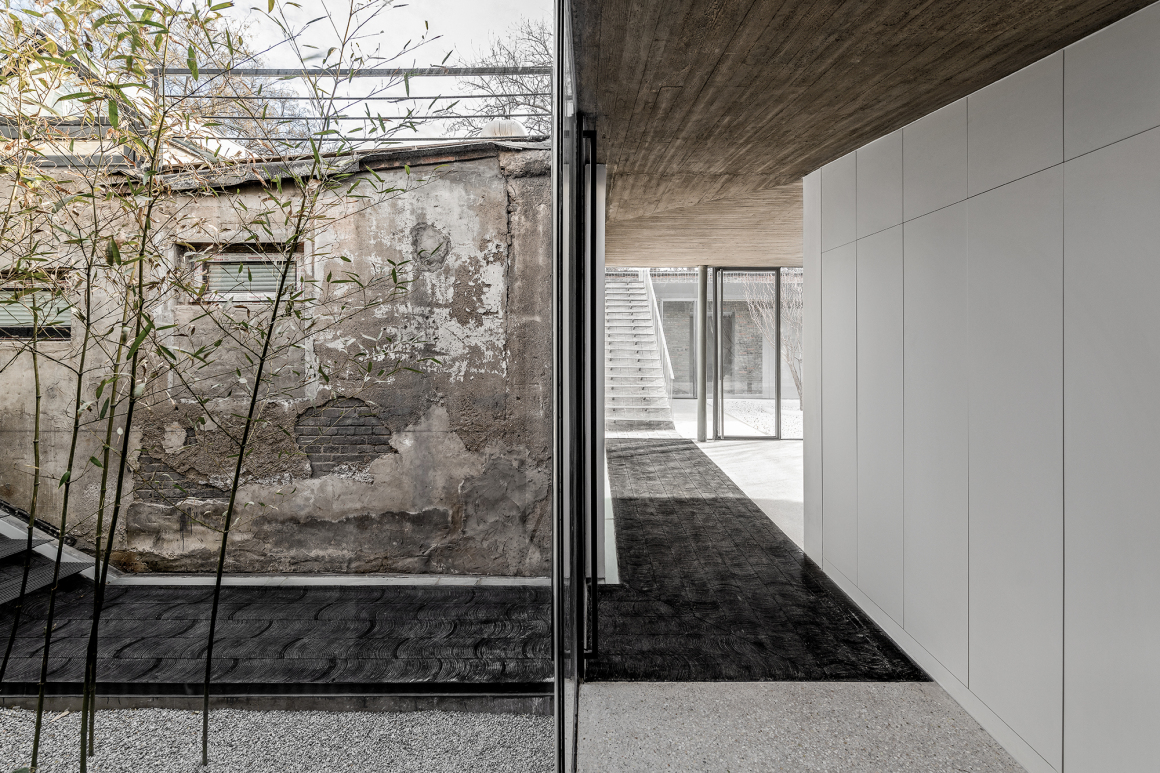
平屋顶是一处在四合院区域难得的公共活动场地,也是内部功能使用的重要延伸,屋顶景观与周边复杂多样的坡屋顶建筑和树木形成有趣的对应。
The even roof is not only a rare public activity area, but also an extension of internal functions, with its landscape forming interesting contrast to the surrounding pitched-roof buildings and trees.
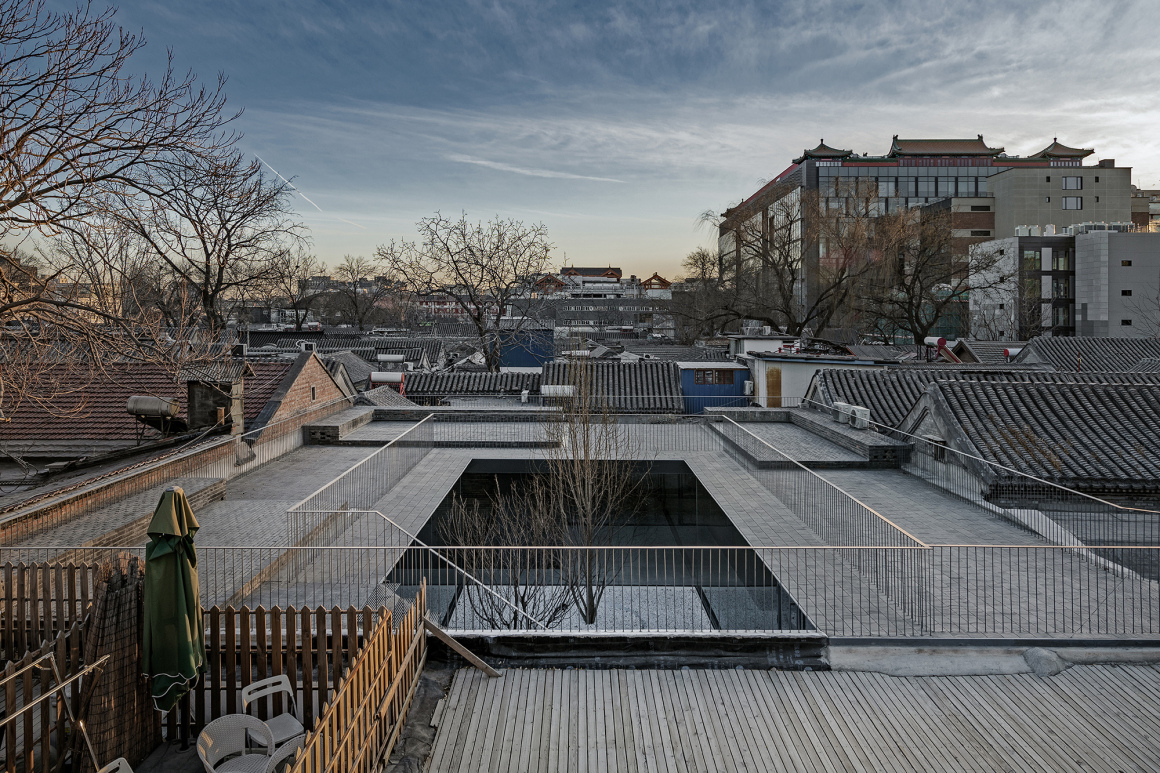
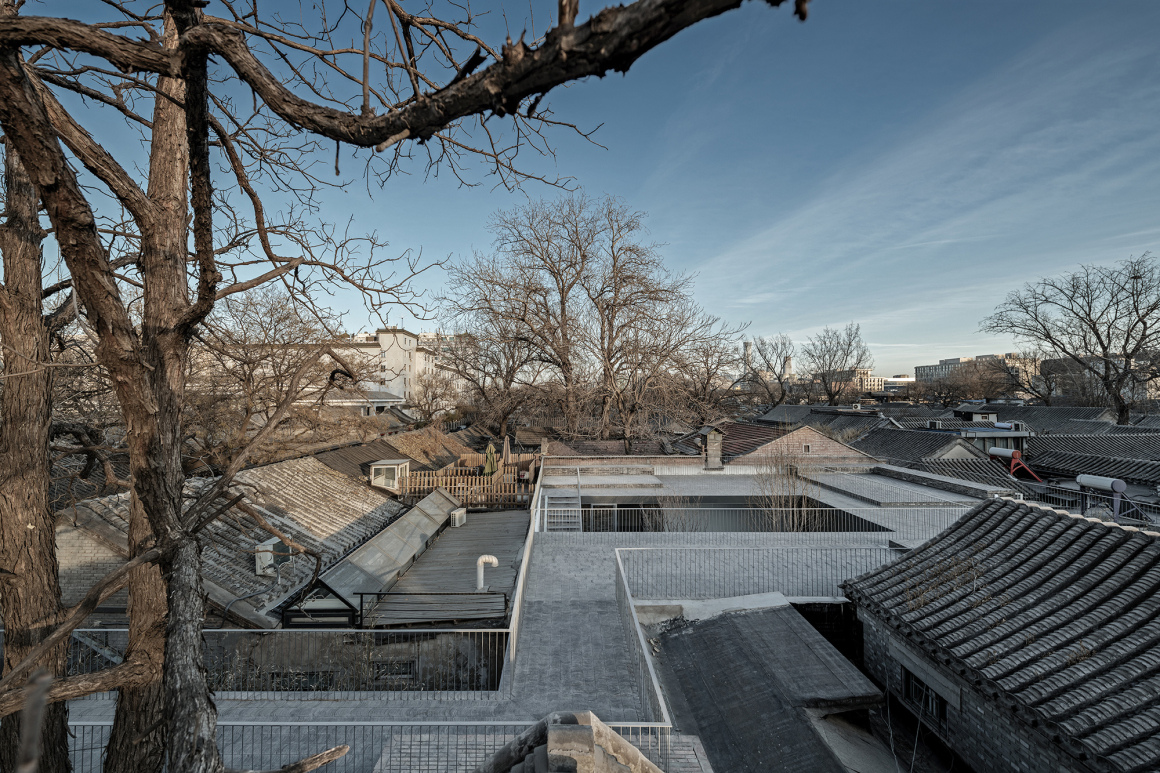
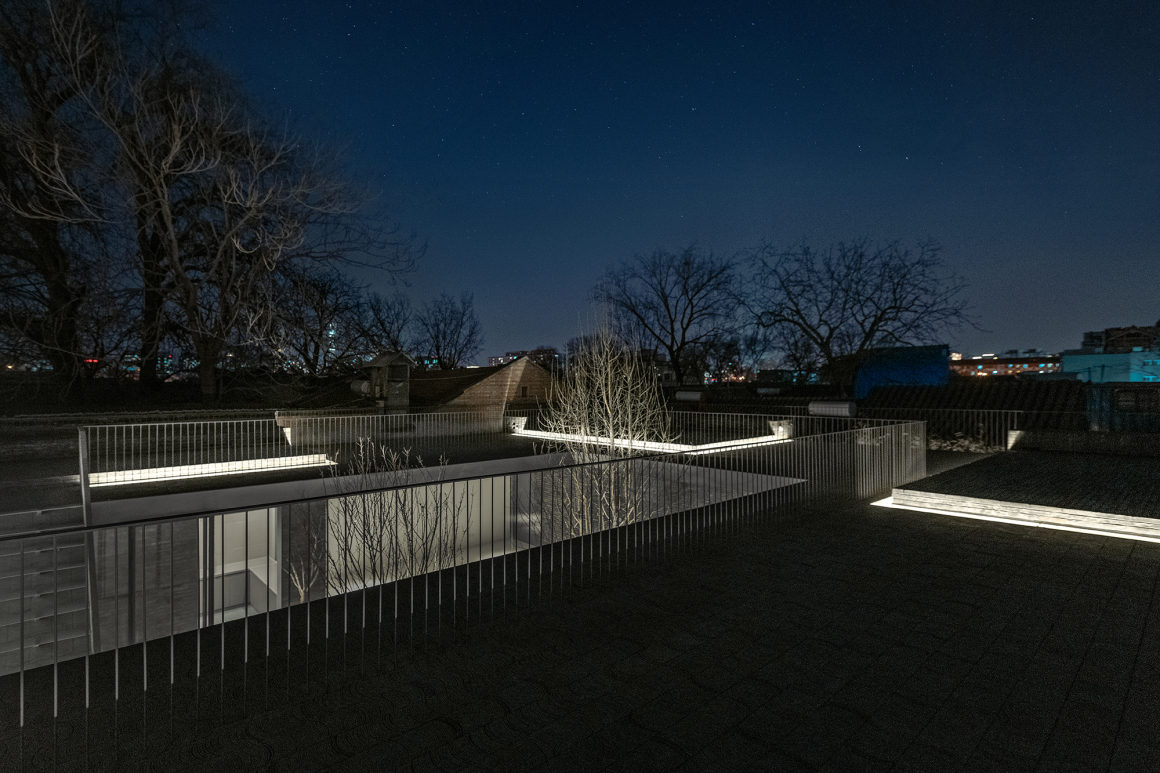
围绕折叠的环线,由入口向内部自然划分出四个不同尺度的庭院——入口处狭长的竹院;保留原有老槐树的树院;清除原来玻璃顶,并置入水景、卵石的水院;以及保留南向与邻里过渡的后院。因此,在这个空间游走将伴随着不断变化的景致。
Along the circulation route, four yards of different scales were marked out, including a long and narrow yard embellished with bamboos at the entrance, a yard with an old locust tree remained in situ, a yard characterized by waterscape and cobbles, with the original glass roof removed, and a south-facing backyard connecting to the neighbor’s house. By following the circulation, people can enjoy variable views in the space.
▼入口 Entrance

▼前厅 Vestibule
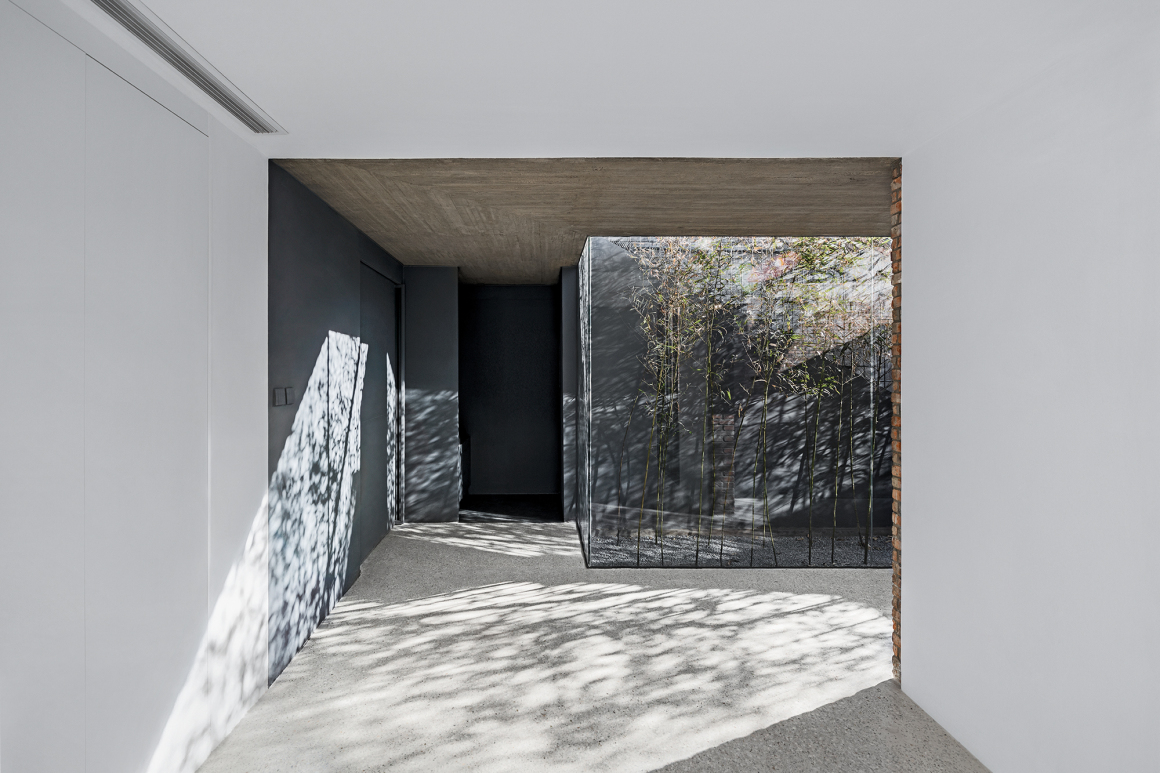
▼入口处狭长的竹院 The long and narrow yard embellished with bamboos at the entrance

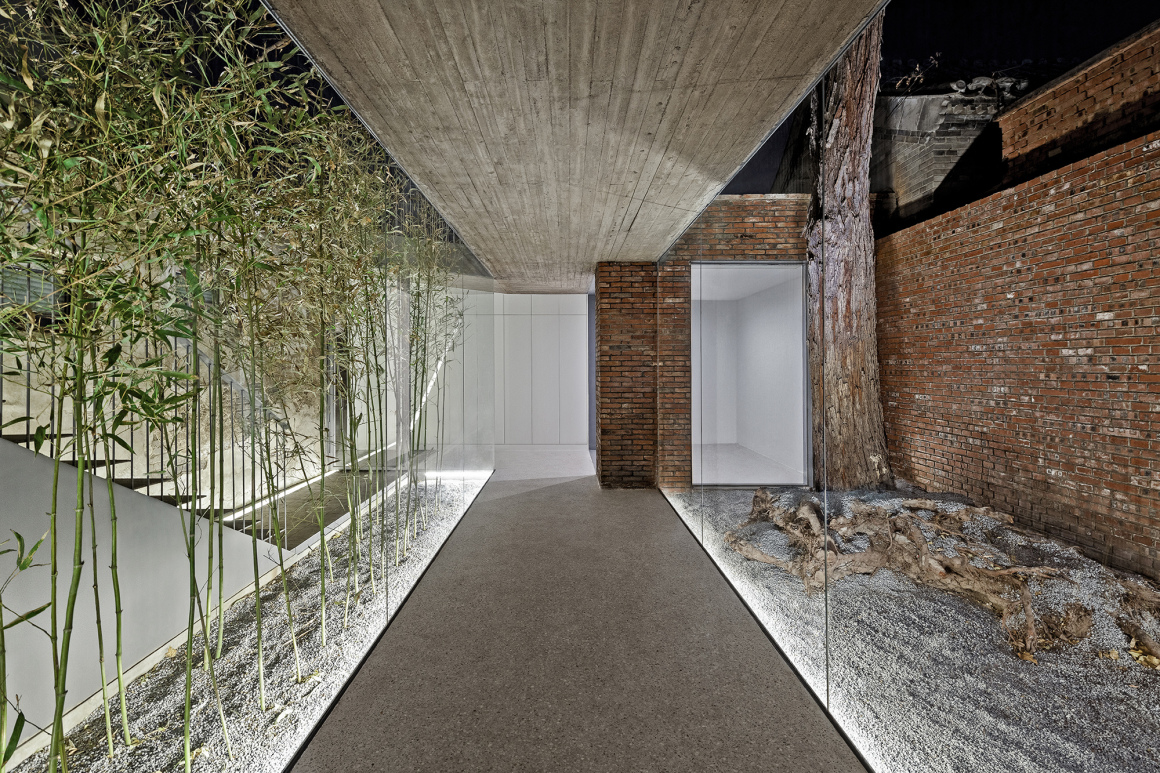
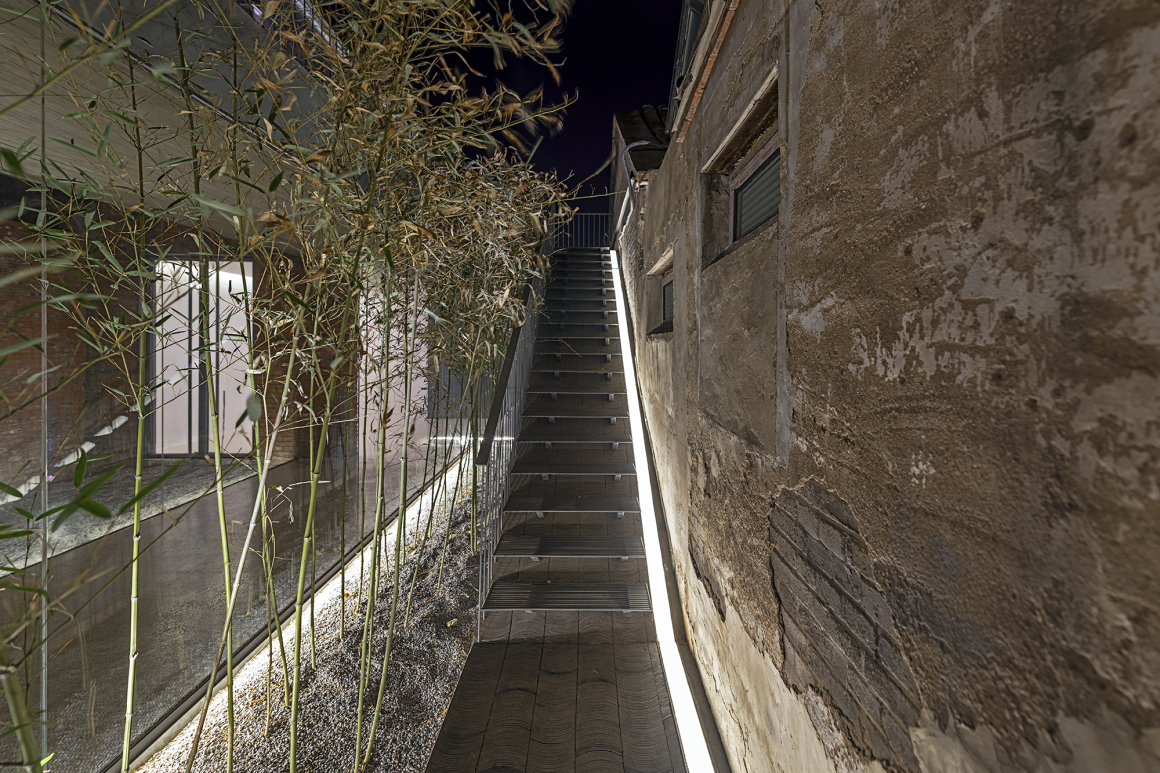
▼树院 The yard with an old locust tree
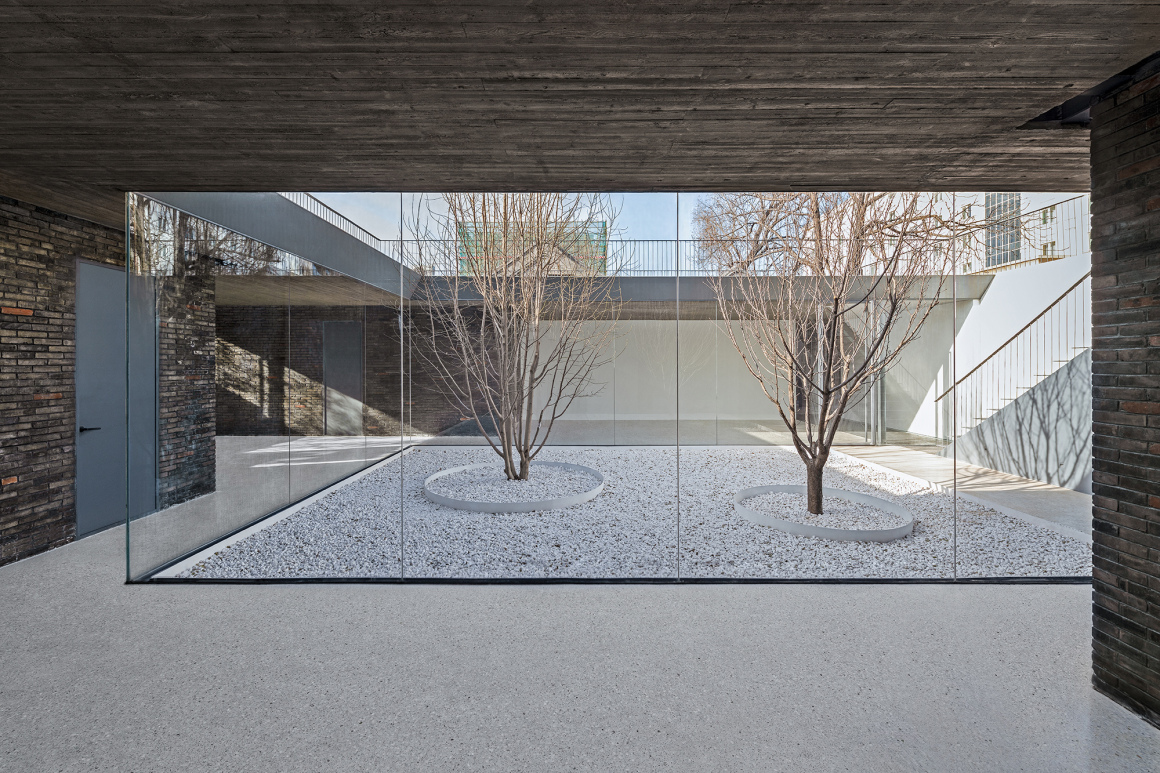
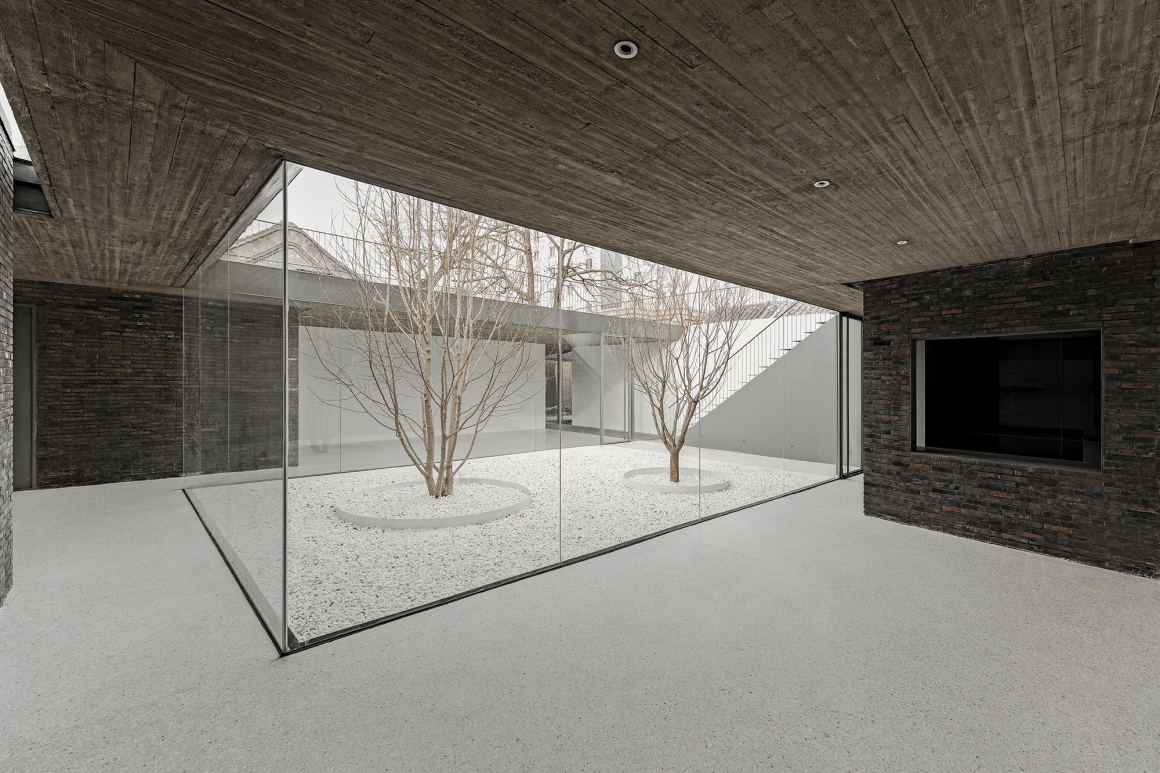
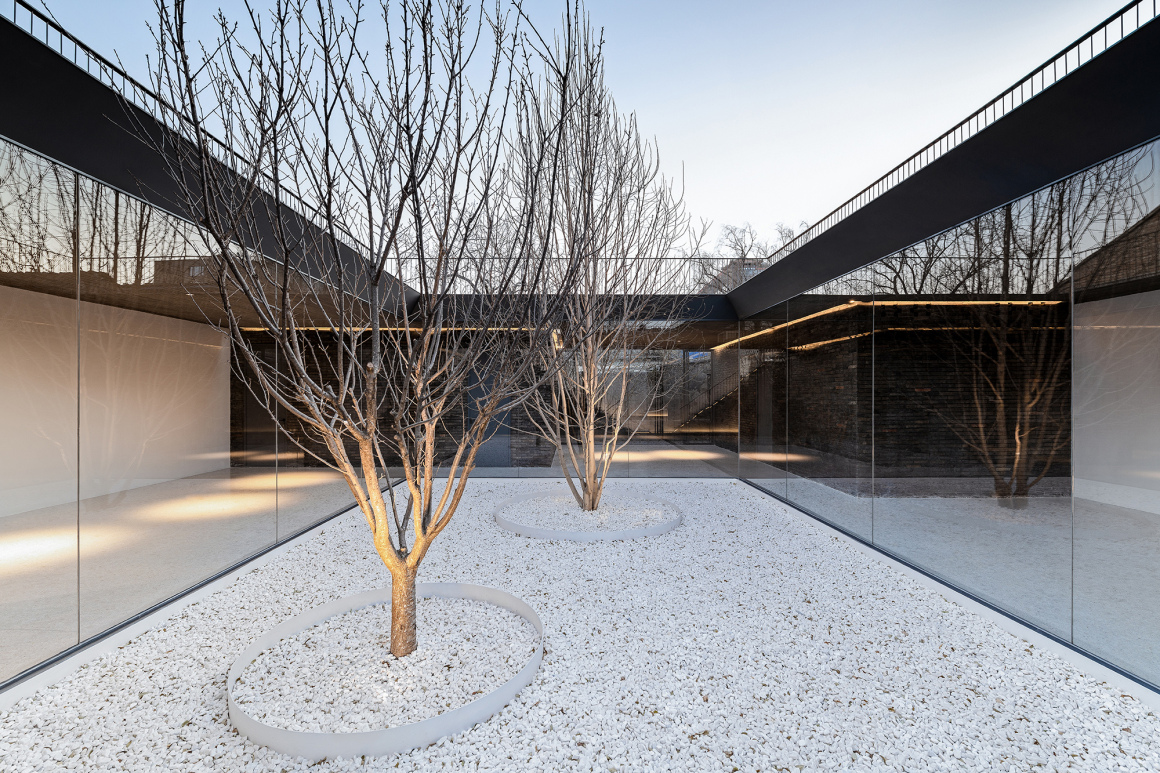
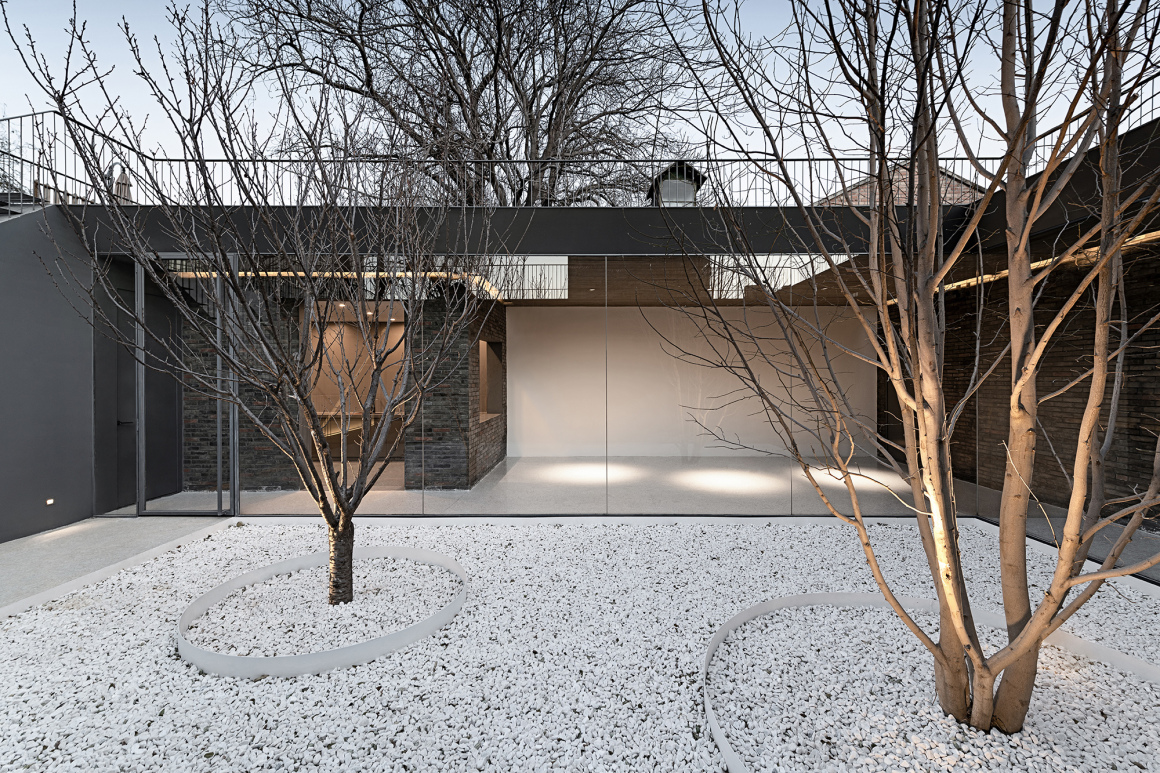
保留原有建筑的两处砖房子,并新增三处砖盒子则作为私密空间,功能分别被设定为休息室、厨房、卫生间等。盒子之间构成连续而又分离的公共区域,可容纳办公、聚会、餐饮等活动。砖盒子墙体内部隐藏着屋面的结构,设计有意让屋面与砖盒子墙面脱开产生天光的缝隙,令二者独立并置。
ARCHSTUDIO retained the two brick rooms that already existed, and at the same time inserted three new brick-structured boxes, which were set as private spaces and can serve the functions of sitting room, kitchen, restroom, etc. The gaps between the three new boxes form a continuous but detached public space for working, gathering, dining and other activities. The architects hided structural columns of the roof inside the brick boxes’ walls, and deliberately left gaps between the roof and boxes, with a view to letting daylight filter in.
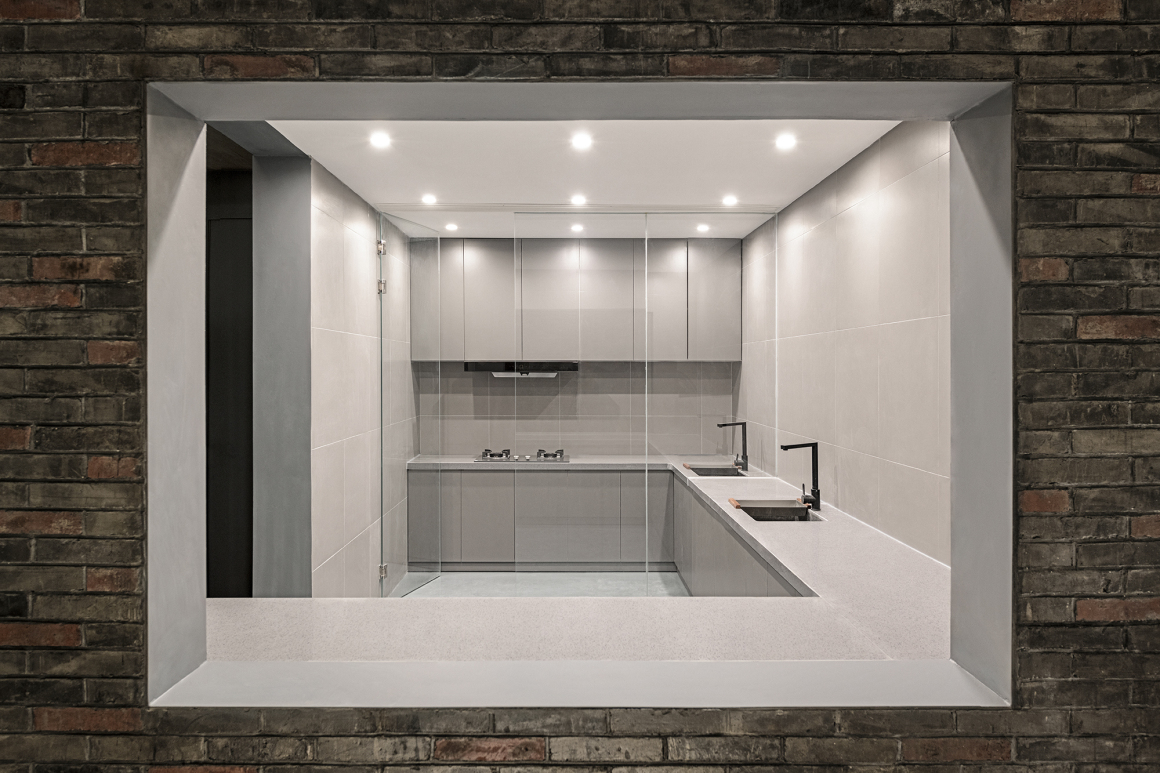
项目沿用了四合院常见的旧砖、青瓦、水泥等作为主要材料。屋面均为立砌青瓦铺装,青瓦按照屋顶不同方向线性排布,并跟随楼梯连接到室内,产生如流水一般的视觉效果。屋面为现浇混凝土板,室内表面保留了木纹模板的自然纹理。砖盒子则是由附近院落拆除的旧砖砌筑的,由墙面延伸到屋顶并形成了休息座椅。
Common construction materials for Siheyuan such as bricks, grey tiles and cement were utilized for this project. The rooftop was paved with grey tiles, which were arranged linearly in different directions. Notably, those tiles extend to indoor area, resulting in flowing-water-like visual effects. The roof has a cast-in-situ concrete structure, and wood grains on interior surfaces generated from the form work was retained. The brick boxes were built with old bricks from demolished houses nearby, with the wall stretching to the rooftop and forming seats for resting.
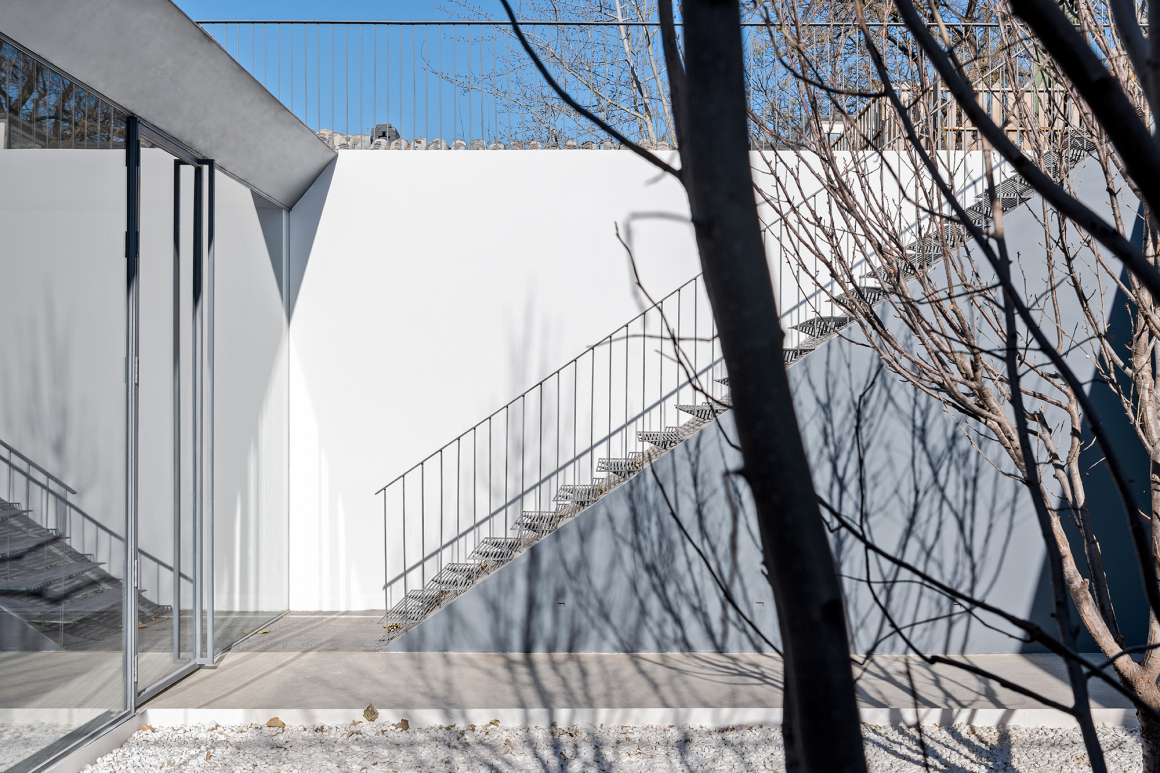
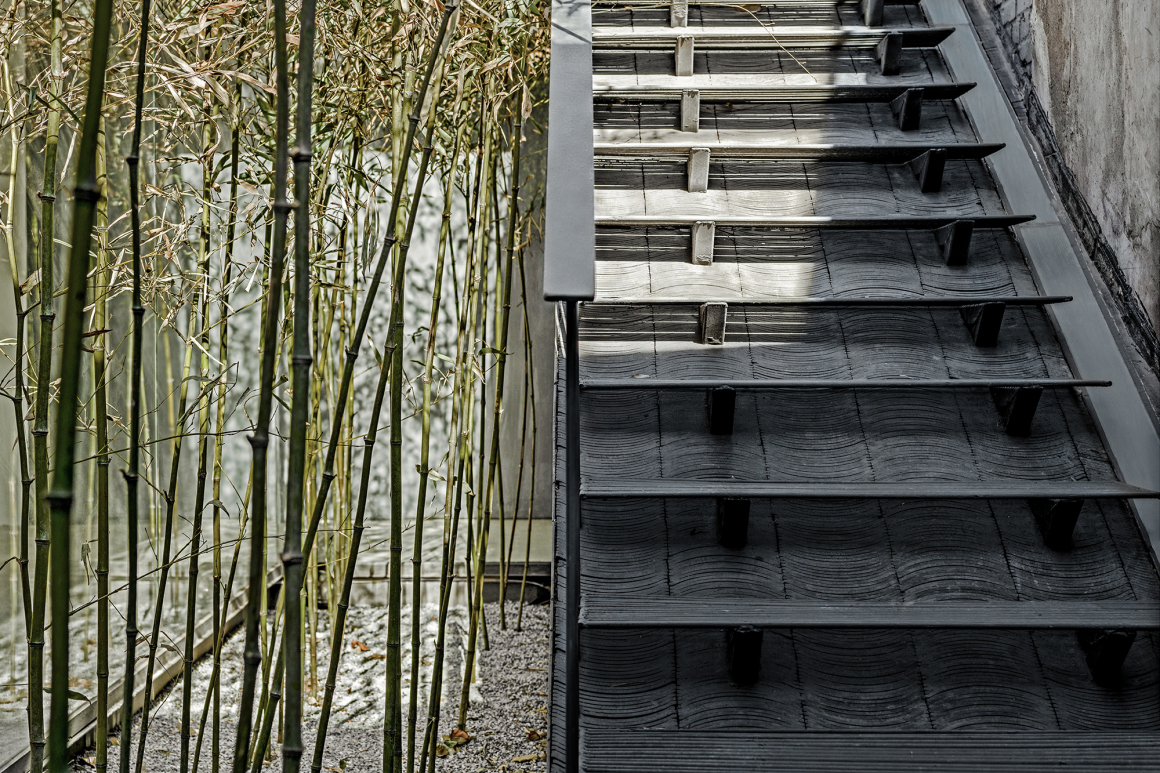
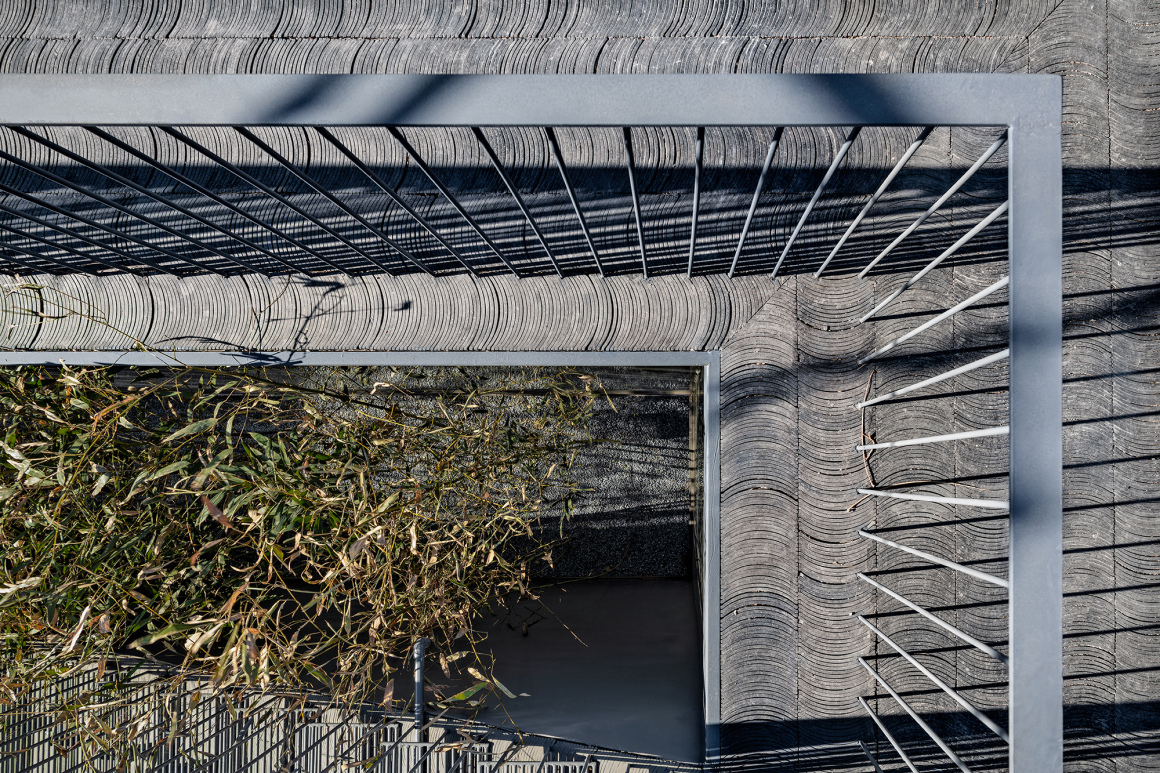
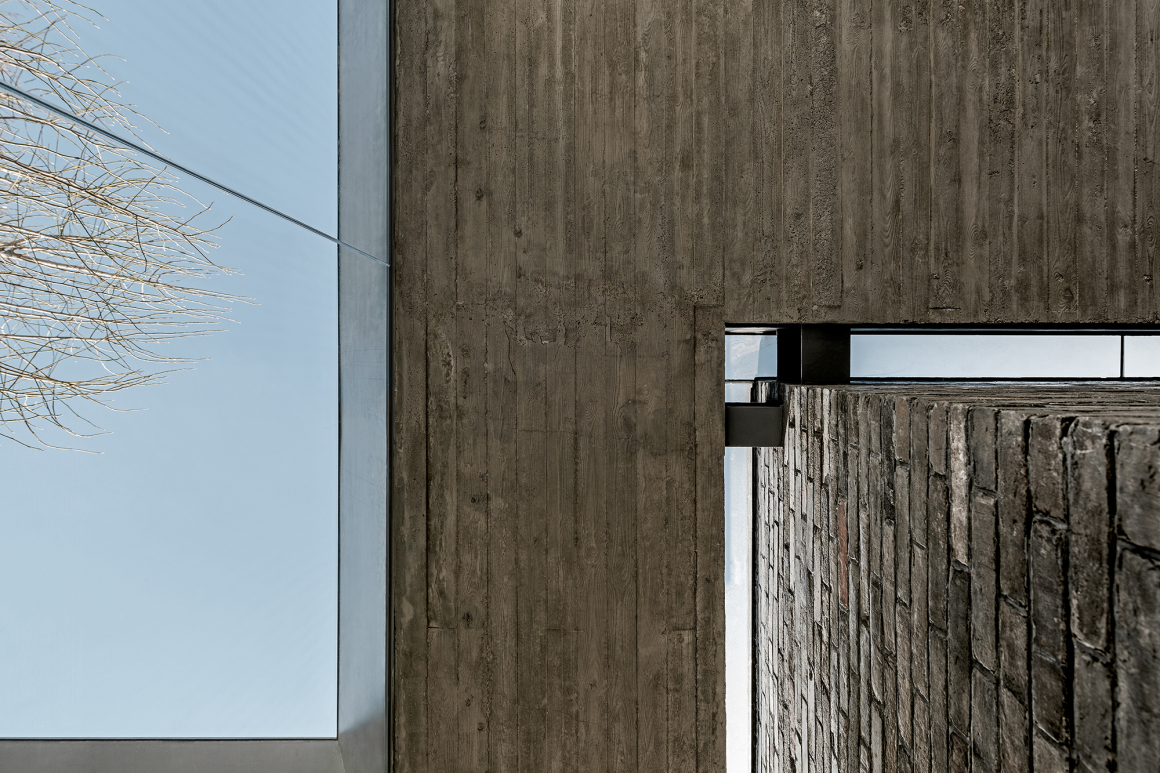
▼一层平面图 1F plan
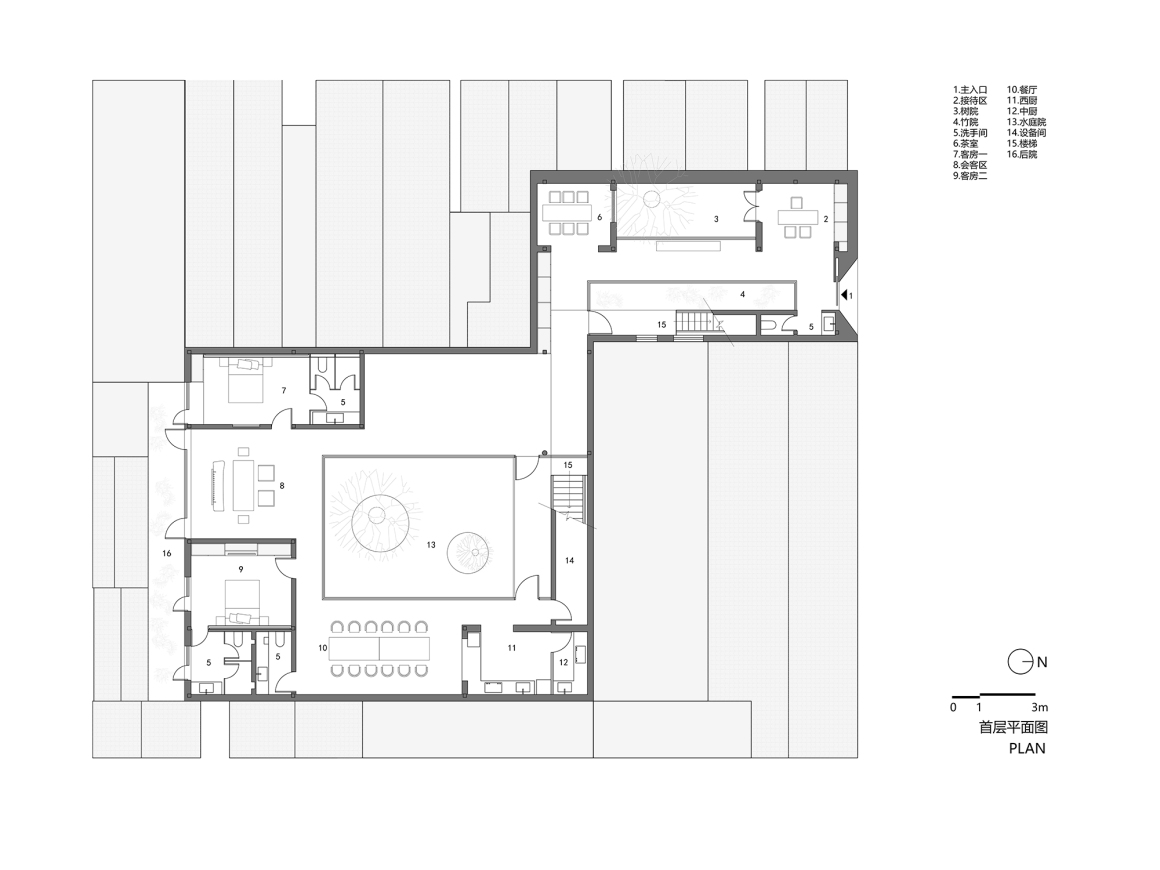
▼屋顶平面图 Rooftop plan
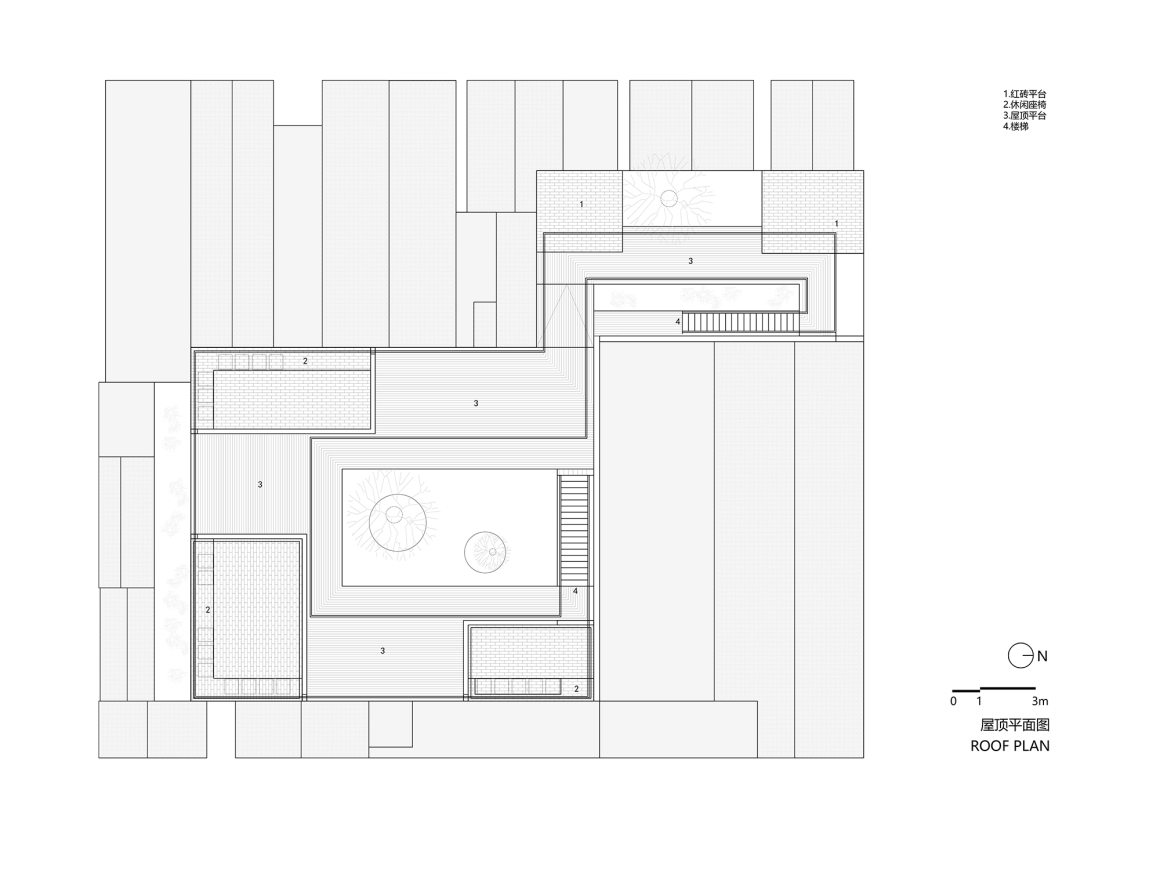
▼剖面图 Section
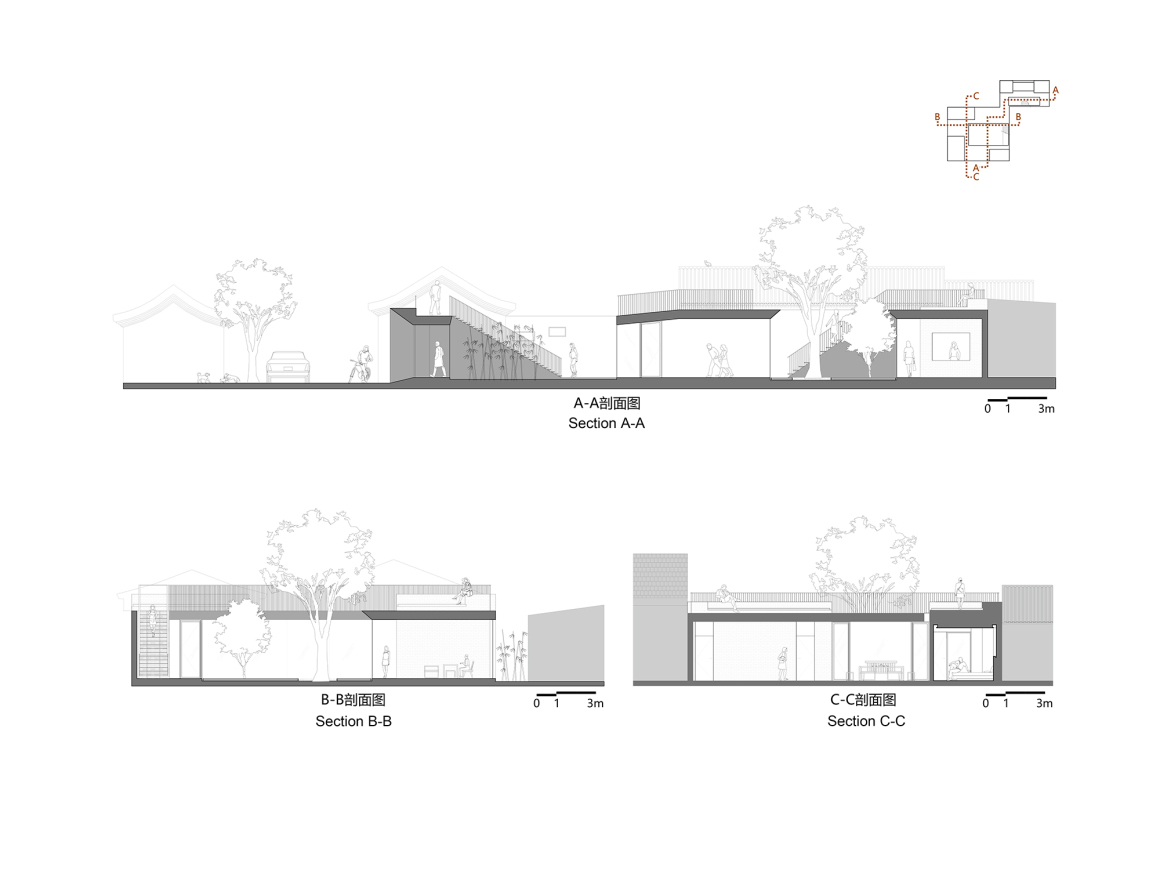
项目名称:折叠院
项目地址:北京市东城区钱粮胡同
占地面积:410平方米
建筑面积:308平方米
建造时间:2018.04—2019.04
主要材料:砖、青瓦、水泥、水磨石、玻璃
设计公司:建筑营设计工作室(www.archstudio.cn)
主设计师:韩文强
设计团队:黄涛、王同辉、张富华、郑宝伟、于妍
摄影师:王宁
Project name: Folding Courtyard
Project location: Qianliang Hutong, Dongcheng District, Beijing
Site area: 410 m2
Project area: 308 m2
Construction phase: April 2018 – April 2019
Main materials: brick, grey tile, cement, terrazzo, glass
Design firm: ARCHSTUDIO (www.archstudio.cn)
Chief designer: Han Wenqiang
Design team: Huang Tao, Wang Tonghui, Zhang Fuhua, Zheng Baowei, Yu Yan
Photography: Wang Ning
更多 Read more about: ARCHSTUDIO



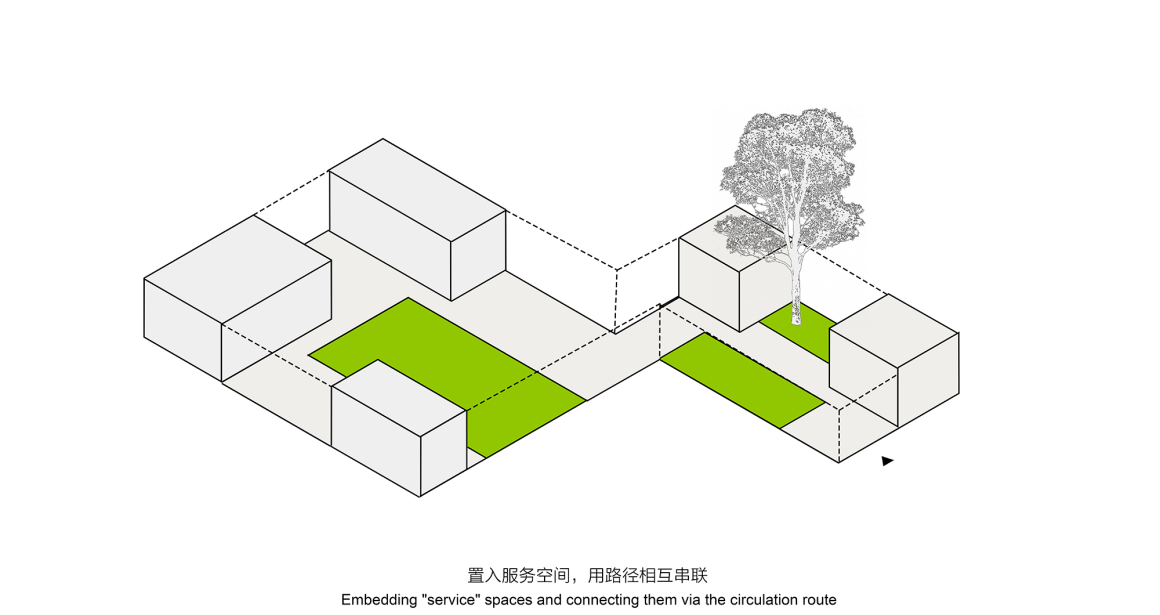
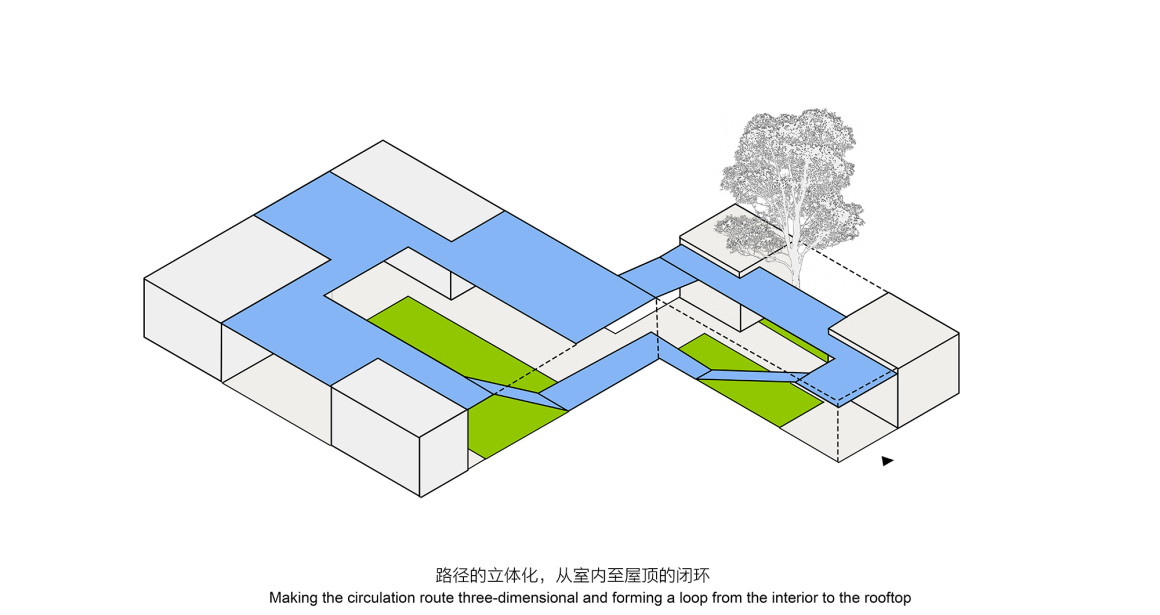
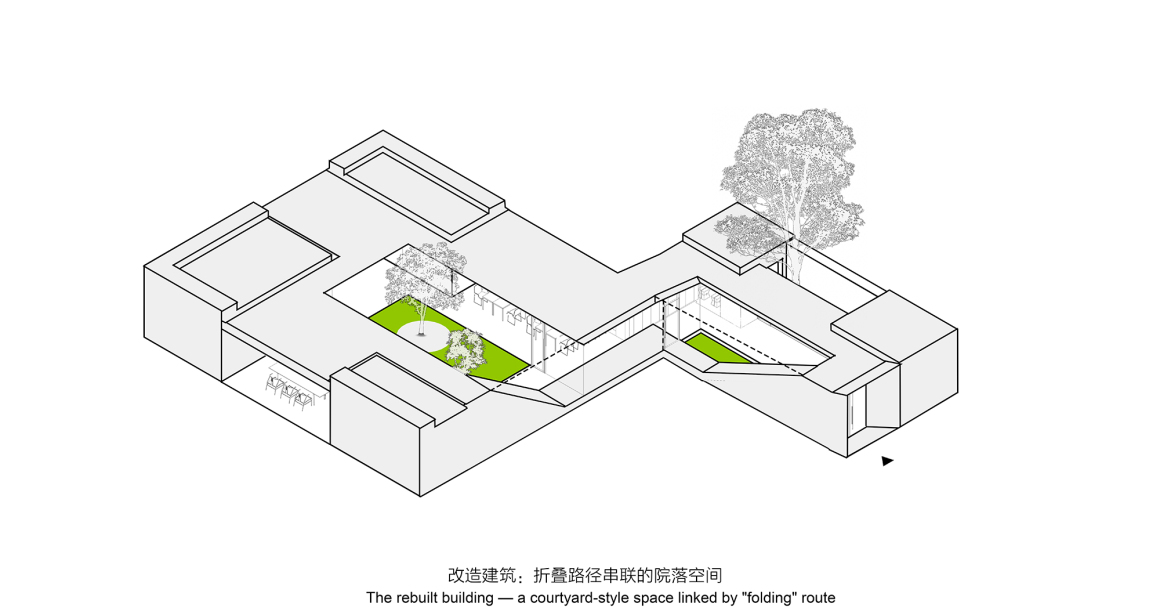


0 Comments